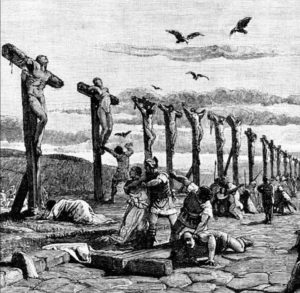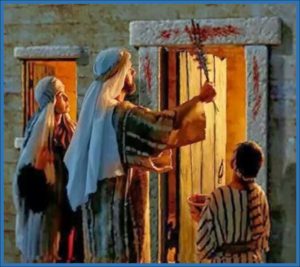Is Crucifixion Accursed by God?
Fated soles were initially executed by way of crucifixion as judicial punishment for committing serious crimes by non-Roman citizens such as murder, robbery and insurrection, but with time, reasons for crucifixions expanded. Thousands of Jews, including priests, were crucified by the Romans for non-criminal, nefarious reasons such as simple hatred, spitefulness or merely for entertainment.[1]
Judaism holds that a person who is hanged is accursed by God.
MISHNAH
“… the sages say: only the blasphemer and the idolater are hanged. (Soncino)
“…but thou shalt surely bury him the same day for he is hanged [because of] a curse against God, – as if to say why was he hanged? – Because he cursed the name [of God]; and so the name of the name of Heaven [God] is profaned. (Soncino)
Scriptural basis for this belief is found in the Law of Moses in Deuteronomy. Very plainly it says that anyone who is hanged on a tree is accursed of God.
- DT. 21:23 “his body shall not remain overnight on the tree, but you shall surely bury him that day, so that you do not defile the land which the LORD your God is giving you as an inheritance; for he who is hanged is accursed of God.” (NKJV)
Connecting “tree” and “cross” is made through translations of the Deuteronomy Hebrew text word `ets meaning “a tree or wood timber.”[2] Jewish translators of the Septuagint LXX used the Greek word xulon meaning “tree” or “wood” and therein lies the connection of the Deuteronomy Law to a cross being considered a “tree” or “pole.”[3]
Jewish and Christian Bibles alike nearly all translate Hebrew word`ets in Deuteronomy as “tree” or “pole.”[4] Crucifixion involved a victim being hanged from its wood cross-timber beam attached to an upright wood pole often called a gibbet.
Committing the offense of blasphemy or idolatry was so reprehensible, execution was not even enough – public hanging of a corpse would tell everyone the person was accursed by God. A Mishnah and a Gemara in the Talmud defines what is to be done with the body that has been executed by hanging.[5]
MISHNAH
“All who are stoned are [afterwards] hanged. (Soncino)
Gemara
“The rabbis taught: It reads [Deut. xxi. 22]: “And he be put to death, and thou hang him on a tree.””
“The rabbis taught: If the verse read, “If a man committed a sin, he shall be hanged,” we would say that he should be hanged until death occurs, as the government does; but it reads, “He shall be put to death and hanged,” which means he shall be put to death and thereafter hanged.”(Rodkinson)
Jews crucified by the Romans, including priests, conceivably could not have all been viewed as being accursed by God.[6] Jesus of Nazareth was no different in that he was crucified like any other Jew by the Romans.[7]
Judaism teaches Jesus was accursed by God because he was hanged on a tree thereby disqualifying him as the Messiah:[8]
“The very form of his punishment would disprove those claims in Jewish eyes. No Messiah that Jews could recognize could suffer such a death; for “He that is hanged is accursed of God” (Deut. xxi. 23), ‘an insult to God’ (Targum, Rashi).” – JewishEnclopedia.com
Jewish leadership believed that the case of Jesus should be handled differently and as such an exception to Jewish Law was needed to distinguish the crucifixion of Jesus from that of other crucified Jews. Sanhedrin 43a describes an exception made for “Yeshu, the Nasarean” through his royal lineage of King David:[9]
Gemara [10]
“…On the eve of the Passover Yeshu [#34: the Nasarean] was hanged…But since nothing was brought forward in his favour he was hanged on the eve of the Passover!.…With Yeshu however it was different, for he was connected with the government [or royalty, i.e., influential].” (Soncino)
Caiaphas and the Jewish leadership found Jesus guilty of blasphemy for claiming to be I AM, an offense worthy of execution.[11] A hurdle that had to be overcome: Rome did not recognize a Jewish court verdict, especially for the capital Jewish crime of blasphemy.[12]
Jewish leadership, instead, handed Jesus over to the Roman government under the accusation of failure to pay taxes and insurrection.[13] If convicted, either Roman crime would result in the same outcome – crucifixion on a cross, a wooden tree.[14]
Indeed, Jesus was judged by the Roman government for insurrection. However, the plan seemed to backfire when neither Tetrarch Herod nor Procurator Pilate found any guilt in Jesus despite admitting to Pilate that he is a King.[15]
Not guilty of any Roman crimes, yet under pressure at the strong behest of the Jews, Pilate still condemned Jesus to crucifixion. Pilate was compelled to wash his hands of the aberrant circumstances saying, “I am innocent of this man’s blood.”[16]
Does the crucifixion of Jesus mean he was accused by God?
Updated January 19, 2025.
This work is licensed under a Creative Commons Attribution-NonCommercial-NoDerivatives 4.0 International License.
REFERENCES:
[1] Josephus. Wars. Book V, Chapter XI. Ciantar, Joe Zammit. Times Malta.
[2] “H6086.” Lexicon-Concordance Online Bible. n.d. http://lexiconcordance.com/search6.asp?sw=6086&sm=0&x=42&y=16> Benner, Jeff. “Mechanical Translation of the Torah.” Deuteronomy 21:23. <http://www.mechanical-translation.org/mtt/D21.html>
[3] The Babylonian Talmud. Trans. Michael L. Rodkinson. 1918. Mishnah IV Gemara. <http://www.sacred-texts.com/jud/talmud.htm> Soncino Babylonian Talmud. Ed. Isidore Epstein. 1935-1948. Sanhedrin 46b Gemara.<https://israelect.com/Come-and-Hear/talmud/index.html> “Recollections on Crucifixion – Part one.” image. 2022. <https://timesofmalta.com/articles/view/recollections-on-crucifixion-part-one.861097>
[4] Net.bible.org. Deuteronomy 21:22, Hebrew text “`ets <06086>” “Septuagint text, Greek “xulon <3586>” <http://classic.net.bible.org/strong.php?id=3586> Bible Hub. 2017. Deuteronomy 21:22. <http://biblehub.com> Josephus, Flavius. Antiquities of the Jews. Book XII, Chapter II. The Complete Works of Josephus. 1850. <http://books.google.com/books?id=e0dAAAAAMAAJ&printsec=frontcover&source=gbs_ge_summary_r&cad=0#v=onepage&q&f=false> “Septuagint.” Septuagint.Net. 2014. <http://septuagint.net> “Septuagint.” Encyclopædia Britannica. 2014. Benner, Jeff A. “The Great Isaiah Scroll and the Masoretic Text.” Ancient Hebrew Research Center. 2013. <http://www.ancient-hebrew.org/31_masorite.html> Lundberg, Marilyn J. “The Leningrad Codex.” USC West Semitic Research Project. 2012. <https://web.archive.org/web/20170403025034/http://www.usc.edu/dept/LAS/wsrp/educational_site/biblical_manuscripts/LeningradCodex.shtml> The Complete Jewish Bible with Rashi Commentary. Devarim – Deuteronomy, Chapter 21. <http://www.chabad.org/library/bible_cdo/aid/9985#showrashi=true> Benner, Jeff, “Mechanical Translation of the Torah.” 2017. Deuteronomy 21. <http://www.mechanical-translation.org/mtt/D21.html>
[5] Soncino Babylonian Talmud. Sanhedrin 45b – 46a. Babylonian Talmud. Rodkinson. Chapter VI, Mishna V.
[6] Josephus, Flavius. Wars of the Jews. Book II, Chapters V, XIII, XIV; Book IV, Chapter V; Book V, Chapters VI, XI. The Complete Works of Josephus. 1850. <http://books.google.com/books?id=e0dAAAAAMAAJ&printsec=frontcover&source=gbs_ge_summary_r&cad=0#v=onepage&q&f=false> Josephus. Antiquities of the Jews. Book XX, Chapter VI.2. The Complete Works of Josephus. 1850. <http://books.google.com/books?id=e0dAAAAAMAAJ&printsec=frontcover&source=gbs_ge_summary_r&cad=0#v=onepage&q&f=false>
[7] Matthew 27:57-61. Mark 15:42-47. Luke 23:50-56. John 19:38-42.
[8] “Jesus of Nazareth.” Jewish Encyclopedia. 2011. <http://www.jewishencyclopedia.com/articles/8616-jesus-of-nazareth> “God Cannot die!” TorahOfMessiah.com. 2012. <https://web.archive.org/web/20140331233206/http://www.torahofmessiah.com/godcantdie.html>
[9] Matthew 27:57-61. Mark 15:42-47. Luke 23:50-56. John 19:38-42.
[10] Soncino Babylonian Talmud. Ed. Epstein, Isidor. “Introduction to the Seder Nezikin.” Soncino Babylonian Talmud. Shachter & Freedman. “Introduction to Sanhedrin.” Soncino Babylonian Talmud. Sanhedrin Chapter VI, Folio 43a. Greenberg, Eric J. “Jesus’ Death Now Debated by Jews.” Jewish Journal. 2003. Reprinted from The Jewish Week. <http://jewishjournal.com/news/world/8546>
[11] NASB. Luke 22:67-70. CR Matthew 26:63-65; Mark 14-63-65.
[12] Josephus, Flavius. Antiquities of the Jews. Book XX, Chapters IX. The Complete Works of Josephus. n.d <http://books.google.com/books?id=e0dAAAAAMAAJ&printsec=frontcover&source=gbs_ge_summary_r&cad=0#v=onepage&q&f=false>
[13] Luke 23:1-3.
[14] Antiquities. Book XX, Chapter V. Josephus. Wars. Book II, Chapters V, XIV. Ashby, Carol. Life in the Roman Empire. n.d. “Crime and Punishment.” <https://carolashby.com/crime-and-punishment-in-the-roman-empire>
[15] Matthew 27:11; Mark 15:2; Luke 23:3, 13-15; John 18:33-38.
[16] NRSV, NASB. Matthew 27:24. CR Matthew 27:24-26; Mark 15:11-15; Luke 23:20-25; John 19:4-15. Josephus. Antiquities. Book XVI. Chapters II, VI; Book XVII, Chapter XIII; Book XIX, Chapter V-VI. Josephus, Flavius. Against Apion. Book II. The Complete Works of Josephus. 1850. <http://books.google.com/books?id=e0dAAAAAMAAJ&printsec=frontcover&source=gbs_ge_summary_r&cad=0#v=onepage&q&f=false


 Psalms 22 is retrospectively viewed by Christians as a foreshadowing or a prophecy consistent with
Psalms 22 is retrospectively viewed by Christians as a foreshadowing or a prophecy consistent with  Leading up to the horrible night of the 10th plague, God offered protection for the Hebrews if they followed a precise sacrificial ritual. Each family was to choose one of their unblemished lambs, sacrifice it, splash its blood on the door posts of their homes, and roast the lamb for a family feast at sunset.
Leading up to the horrible night of the 10th plague, God offered protection for the Hebrews if they followed a precise sacrificial ritual. Each family was to choose one of their unblemished lambs, sacrifice it, splash its blood on the door posts of their homes, and roast the lamb for a family feast at sunset.